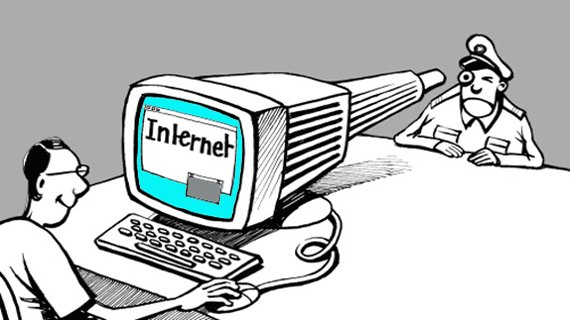WHEN THE GOVERNMENT 'NOSES' INTO OUR PRIVACY

In 2014, Global Information Society Watch (GISWatch) made a publication authored by John Dada and Theresa Tafida on "Communications Surveillance in the Digital Age". In that publication, it was revealed that the Nigerian Government had purchased a USD 40million Israeli Technology "to be used for the monitoring and control of the internet" and justifying itself on the grounds that other world governments have a surveillance system to monitor citizen communication.
Only a week ago, the Nigerian Senate reintroduced a bill that according to them would 'regulate' the use of social media platforms in Nigeria to curb fake news and defamation of character against government officials of course. This would mean that every social media user in Nigeria would be highly monitored and if he or she makes for instance, a post considered too critical of any top government official, it would be considered 'defamation of character' or fake news and that person would be sentenced to 6 months in prison or a fine of N150,000. This is coming just after the arrest of several journalists whose crimes were nothing but revealing the corrupt practices of government officials and agencies in the month of September. This and the purchase of the surveillance technology as well as this obnoxious bill portray the height of government surveillance in Nigeria.
Government surveillance is even more disturbing on this part of the world where there is no legal structure to support citizens' privacy. Hence, our communication on different social media platforms is highly monitored and can be used at any time by the government to manipulate us to acceptance of its dictatorial rulings. And with the continuous decline of internet privacy where an individual's personal information is literally flying in the air, thanks to facebook, google and social media platforms, it's virtually easy for government to intercept communication and use personal information of citizens to manipulate the society.
Particularly, Identity privacy has declined such as that a person's bank transactions, last seen and current location, current occupation can be assessed in one click. Personally, I've been conscious of the information I put up to public eye recently but even with that, I was ultimately shocked when I received a text message a few months ago from an unknown number that listed my exact whereabouts last year and a code proving my identity only known to me and those within my circle and was making a strange request. This is just one of the several instances that show the drastic decline of privacy in the 21st Century. Now with National Identity Number(NIN) and Bank Verification Number(BVN), every single Information of a person can be ridiculously easy to access and these numbers are under the control of the government!
However, as these communication technologies and platforms advanced to the point of privacy threat, blockchain technology developed along side with a feature that promotes privacy to a large extent. With its decentralized feature, fraudulent transactions can be easily nullified and transactions and communication could be carried out without necessarily invading the privacy of its users. Many blockchain platforms have been developed in the recent years, for instance, Stegos, particularly to combat the issue of government surveillance and the threat of privacy loss in citizens' communication and other private transactions.
.jpeg)
The justification of government surveillance has always been on the basis of crime prevention and interception of terrorist communication. Notwithstanding, the government has proven to be the last entity to be trusted with private personal information. Innocent citizens have become suspects and the society at large is susceptible to Government manipulation through its privacy invasion. Even in countries like the United States where there are laws limiting the extent to which the government can use its surveillance machinery on citizens as seen in the
Fourth Amendment, American citizens are still plagued by PRISM, a surveillance program used by the FBI, CIA and NSA.
This leaves us with the option of blockchain technology to protect our privacy through cryptography and private and public keys that gives no private details about a user. This can be adopted on different levels such as basic transactions through the use of cryptocurrencies and communication and connectivity where users privacy are protected by a digital signature that is impossible to decrypt. In all these, it is safe to say blockchain platforms, such as Stegos, is the way forward if government surveillance is desired to be curtailed.
Congratulations @shiphrah! You have completed the following achievement on the Steem blockchain and have been rewarded with new badge(s) :
You can view your badges on your Steem Board and compare to others on the Steem Ranking
If you no longer want to receive notifications, reply to this comment with the word
STOPVote for @Steemitboard as a witness to get one more award and increased upvotes!